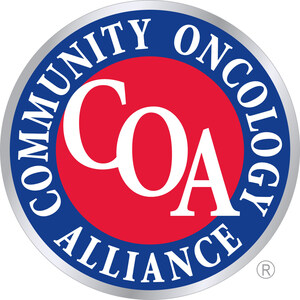Community Oncology Alliance Applauds Inclusion of Medicare Payment Site Neutrality in Budget
Important First Step in Lowering Costs for Seniors with Cancer and Medicare
WASHINGTON, Oct. 28, 2015 /PRNewswire/ -- The Community Oncology Alliance (COA) applauds Congress for including a fix to the disparity in Medicare payments to hospital outpatient departments and physician offices in their bipartisan budget deal. The site-neutral payment fix will result in lower costs for seniors, especially with cancer, the Medicare program, and taxpayers. Starting in 2017, Medicare will pay identical rates for critical cancer care services, such as the administration of chemotherapy, whether provided in physician-directed community cancer clinics or hospital outpatient departments.
"We wholeheartedly endorse the inclusion of the Medicare payment site-neutrality provision in the budget deal. This is a much-needed first step to lowering the costs of cancer care for both seniors and Medicare," said Ted Okon, executive director of COA. "Cancer patients are hit with higher bills when a hospital acquires a community cancer clinic, even though they are being treated in the same facility and by the same physicians and nurses. This is unconscionable."
Research studies by Avalere, Berkeley Research Group (BRG), Milliman, The Moran Company, and others have consistently shown that costs are higher for seniors, Medicare, and private insurers for cancer care delivered in the hospital outpatient setting, which includes acquired cancer clinics. For example, a study recently published by BRG showed that the cost of outpatient cancer care in 340B hospitals was 52% more than in physician directed community cancer clinics. The Government Accountability Office and MedPAC have published similar findings on the higher costs of hospital-based medical care.
Medicare site payment disparity, as well as the financial incentives of the 340B drug discount program, present substantial incentives for hospitals to consolidate cancer care through acquisitions, leading to higher costs and access-to-care issues, especially in rural areas. COA publishes a Practice Impact Report tracking this shift and the changing landscape of cancer care. Since 2008, 313 community cancer clinics have closed treatment sites and 544 practices have been acquired by hospitals. This reduces patient choice, moves patients to more expensive care settings, and increases the overall cost of cancer care.
COA urges the Congress to build off the site-neutrality payment fix with other policies urgently needed to stabilize the nation's community cancer care delivery system.
About the Community Oncology Alliance:
The Community Oncology Alliance (COA) is a non-profit organization dedicated to advocating for community oncology practices and, most importantly, the patients they serve. COA is the only organization dedicated solely to community oncology where close to 70% of Americans with cancer are treated. The mission of COA is to ensure that patients with cancer receive quality, affordable, and accessible care in their own communities. For nearly 12 years COA has built a national grassroots network of community oncology practices to advocate for public policies that benefit patients. By offering innovative solutions to Congress and policymakers, empowering patients, and working closely with other healthcare stakeholders, COA is helping to shape a future where all Americans have access to quality, affordable cancer care. Learn more about COA at www.CommunityOncology.org.
SOURCE Community Oncology Alliance
Related Links
WANT YOUR COMPANY'S NEWS FEATURED ON PRNEWSWIRE.COM?
Newsrooms &
Influencers
Digital Media
Outlets
Journalists
Opted In





Share this article